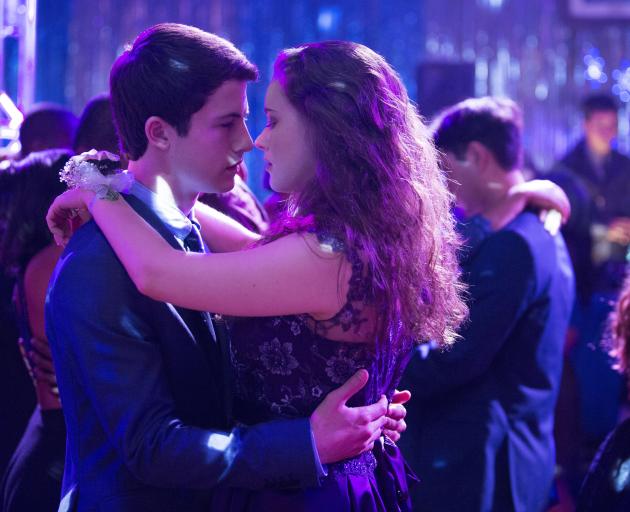Controversial series 13 Reasons Why has set the teenage world on fire. Pam Jones provides a parent's perspective.

Parents, be warned: your children have dived into a series of controversy, of cyber bullying, sexual abuse, sexuality and suicide.
It's a fictional series, but we can't ignore it. Want to know what's going through your teenager's mind at present? Ask them if they have watched 13 Reasons Why. But equip yourself before you do so. Being a parent brings about tough stuff. This is some of that tough stuff.
13 Reasons Why is a Netflix series unlike anything society has seen before. It focuses on a fictional teenage character called Hannah Baker and it's gruelling and all-consuming and impossible to dress up what happens. Hannah Baker kills herself, but before she does so she makes 13 tapes, each focusing on a person in her life who she says contributed to her death; the tapes are delivered to all 13 people.
Part of the series' controversy is the nature of the tapes: the premise that Hannah sending them was an act of revenge in which she blamed others for what was ultimately her choice. Teenage fans of the series say they see it differently, that the tapes allow Hannah to finally have a voice, show how brutal life in high school can be and that there is never any one reason why a person commits suicide, but many contributing factors.
Academics, psychiatrists, mental health experts: many of them are warning against teenagers watching this series, worried about suicide contagion, which they say has occurred with some teenagers who have binge-watched the series, particularly in the United States. Teenagers: they say the lecturing is just another case of adult postulation. The show's creators say the series is meant to be difficult to watch, and depicts the true horror of suicide and its aftermath; they stand behind the series 100%.
Yeah, this is big stuff. So what are parents meant to do?
Some guidance is available from New Zealand's Classification Office (CO), which has created a new RP18 rating specifically for the series. This means someone under 18 must view the series with the supervision of a parent, guardian or other responsible adult over 18. The CO says the classification recognises that teens are watching and will continue to watch the series, but also signals the series' strong content. It emphasises "the essential role of parents and caregivers in discussing this material with young people in their care''.
The show, as well as causing controversy for its treatment of teen suicide, also includes bullying and intense violence, and strong scenes of sexual violence.

The CO discussed the series with teens aged 14-18. Deputy Chief Censor Jared Mullen said the teens "felt the show addressed issues that were relevant to them, and that the series overall had positive messages relating to social awareness: treating others with respect and compassion, and raising awareness about suicide, sexual violence, bullying, and other issues''.
"Nevertheless, there are real risks created by the portrayal of suicide in 13 Reasons Why. The suicide method is clearly shown, contravening established health guidelines and creating the potential for copycat behaviour. The real links between mental health and suicide are not discussed at all in the series. The choice of the lead character to kill herself is also portrayed quite fatalistically. In real life, most of those with suicidal thoughts recover, and do not go on to end their lives.''
Mr Mullen said issues the series presented needed to be talked about "in a way that is informed and safe - parents, guardians and other adults need to have open conversations with teens about the issues raised by the show. Parents should use their judgement about whether their teen is ready to watch this show and then watch it with them. The series raises a lot of issues but often fails to fully address them, and it's really important that trusted adults can step in at that point''.

Central Otago school counsellor Julie Williamson, who works at Dunstan High School, in Alexandra, agrees with everything the CO said, and advises parents to watch the series.
"Parents need to know the show is rated 18 because of what it contains, and they need to watch it. Teens need to know that adults in their lives are there for them and that we can talk about the harder stuff.''
Mrs Williamson has watched the series herself, and said as a school counsellor she felt that was essential, as many of the pupils she saw in counselling would have watched it.
She has some concerns about the series: the graphic suicide scene; how it failed to show any of Hannah's friends standing up for her or fighting for their own beliefs; and the negative portrayal of unhelpful and unprofessional teachers and school counsellors.
"All the big red flags were ignored or brushed over [by adults]. This was a very unrealistic picture of what happens in schools: well especially at Dunstan! All our teachers are trained in safe talk, and know how to respond and refer.''

But in terms of how it might help suicide prevention, Mrs Williamson said the series had brought the topic of suicide into the open more than any other show.
She said it had been "very interesting listening to teenagers' point of view around the show, particularly the vulnerable or `high risk' teens''. She was hearing comments such as "it didn't make me feel better or worse, just reminded me I'm not alone'', and "the main thing I got from the show was just be kind, as you never know what else has happened in someone's day already''.
"The teens I have talked to didn't see Hannah's suicide as glorified, or used as revenge, like many adults have expressed concern about. For the most part, they saw it as very realistic - this is how many teens feel - small comments/offhand remarks hurt more than we can imagine.
"In the ideal world, parents would watch this with their kids and talk through it. But realistically most teens will watch this on their devices, in their bedrooms, and probably on their own.
"So what's important is parents go ahead and watch the show themselves, then start conversations, little snippets every so often: `Hey, I watched 13 Reasons Why, it's a bit addictive isn't it?' or `So glad I'm not a teenager any more, must be hard?'.''
New Zealand Mental Health Foundation chief executive Shaun Robinson says he can see "both sides'' of reaction to the series: those who think it starts conversations about issues that get "swept under the rug'', and those who say the show reinforces some dangerous myths about suicide.

The foundation has developed a hub of resources to "help you have challenging conversations'' about the series and know what to do if someone is experiencing suicidal thoughts or needs someone to talk to. He encourages families to consider the advice in the hub (website link in factbox).
WellSouth suicide prevention co-ordinator Paul Martin says he is not going to watch 13 Reasons Why and explains his reasons and concerns.
"Because I have been exposed to suicide both as a person who has attempted in my youth and as a person bereaved by suicide, because I work in this job, and some of the awful stories I hear, I won't watch 13 Reasons Why or any of that kind of stuff, because I know it will upset me and make me feel vulnerable.''
Instead, he is informing himself about the series, and outlining what he believes are the significant risks it creates for vulnerable people. In terms of positives, he said the quality of international and local debate that had resulted about how media could provide safer messaging was good.
He also makes this point: "Rather than the media just listing all the 0800 numbers at the end of the article on suicide, they could instead say `here are some things you can actually do practically to keep yourself and your loved ones safe' ... The counsellor, psychologist or psychiatrist might be able to meet with them [a vulnerable person] for say 60 minutes a month, but can't be there 24 hours a day. The person themselves and their family and whanau have to take responsibility for keeping themselves safe.''
New Zealand's pre-eminent suicide researcher, Annette Beautrais, criticised 13 Reasons Why at a recent public information evening in Alexandra about how to keep teens safe, saying suicide contagion following the series had been proven, and teens were unable to perceive risk and potential harm from the series.
She did not answer questions from the Otago Daily Times about whether she had watched the series, and said she did not have time to comment for this article.
There is much other online opinion about the series, most from overseas experts warning against watching it, some from people who have not watched it themselves. But I found only one article by a young person, who, coincidentally, was from Central Otago.
University of Otago student Maddie Grant (20) attended Dunstan High School and is a suicide survivor. She has written a story on the Stuff website under the pen-name of Maddie Robinson called "13 Reasons Why Matters. This is Why''.
In it, Ms Grant (who asked to use her real name for this story) said she had spoken out because she was "pretty sick of being spoken for by people who have no first-hand experience in the topic of suicide''.
She criticises those who seek to censor or ignore the series, rather than focusing on the need for more education about suicide.
"If concerned adults are unhappy with how suicide is being portrayed in the show and then being discussed by young people, what alternatives do you suggest? Obviously, your tactic of avoidance has not worked out well for us.''
Ms Grant said young people wanted to understand suicide - "the show ratings prove that'' - and the shift towards discussing suicide was "a scary change for many parents, but I believe it is a good change''.

Myself? Like many of the teenagers devouring the series, I binge-watched. I watched two episodes a night for three nights in a row and then one more and then I needed a break. I couldn't get Hannah or her friends out of my mind. The series was brutal, incredible for good and terrible reasons.
Later, I watched another three episodes in a row in one night. All of this was with my 17-year-old daughter, a member of the anti-cyber bullying group Sticks 'n Stones, who had already watched the whole series almost without me realising it. Our roles were reversed, as she warned me about parts I would find difficult, and watched me for signs of distress. I averted my eyes for some of the scenes of sexual violence, and chose not to watch the actual suicide scene.
I felt sick during parts of the series, mostly because I knew the terminology of the teenagers was real and reflected what many probably felt. And I knew Hannah could have been anyone's daughter.
I'm glad I finished the series and, like the experts who have actually watched it, would advise parents to talk to their teenagers about it. Aside from anything else, it's a good reminder of what our children are accessing privately online, and of the need as parents to set our own rules regarding viewing in our homes.
But your teen may still watch it somewhere else. I'm not qualified to say who 13 Reasons Why might help and who it might harm, but what I do know is the series has arrived and we can't "put it back in the box'' and ignore it. If you have questions as a parent, go to someone for advice: talk to other parents, phone your school counsellor, go to your child's teacher, contact mental health experts or helplines.
My daughter told me about what she considered the perfect approach from an adult, from her tutor teacher who said to her group something like: "Hey, I'm thinking about watching 13 Reasons Why and I've heard it's pretty full on. Have any of you watched it? You guys know you can come and talk to me or someone else about any of the things in the series, don't you?''
The strongest message I took from 13 Reasons Why? The memory of my daughter asking me mid-series what I thought of it so far. Stone-faced, slowly, still processing my thoughts, I replied: "that people should be nicer to each other''.
"Good,'' she said. "That's what you're supposed to think.''
Disclamer: Pam Jones' daughter Sarah Vilela is a founding member and current chairwoman of the anti-cyber bullying group Sticks 'n Stones and took part in the information booth and panel at a recent Alexandra parents' information evening about suicide prevention and online and sexuality issues.
Ms Jones knows Maddie Grant personally, and other families who have been affected by suicide and suicide attempts.
Another view

New Zealand's Chief Coroner Judge Deborah Marshall declined to comment directly on 13 Reasons Why, noting coroners were not suicide prevention experts, but had the job of establishing the cause of a death and making any recommendations that may prevent similar deaths happening again in the future.
However, she provided this statement when asked if there was a need to bring the subject of suicide out into the open and discuss it more: ''Since my office began publishing the annual provisional statistics, the number of people who have died by suicide since 2007 is between 529 and 579 annually. This suicide rate is consistent and shows we have much work to do in turning this unacceptably high total around.
"I firmly agree that we, as a society, need to have a more public discussion about suicide, and we all have a role to play; including family, friends and colleagues who can help identify someone who needs support and where to get help. I also agree that any public discussion needs to be framed in a constructive context, rather than sensationalised."
Factfile
What parents can do:
The Classification Office advises parents to use their judgement about whether their teenager is ready to watch 13 Reasons Why and, if so, watch it with them, or try to watch it before they do. It's then vital to discuss it with them and let them know there are adults they can talk to about any of the issues in the series.
If your teen has already watched the series, watch it yourself so you can discuss the show with them.
If they do not want to watch it with you, still watch it yourself so you can discuss episodes afterwards with them.
For more advice, read the office's full public statement here: www.classificationoffice.govt.nz/news/latest-news/media-release-13-reaso...
Advice and information about 13 Reasons Why from the Mental Health Foundation: www.mentalhealth.org.nz/home/news/article/159/13-reasons-why-what-you-ne...
The Mental Health Foundation's Ways to Wellbeing:
www.mentalhealth.org.nz/home/ways-to-wellbeing/
Where to go for help:
Lifeline: 0800 543 354 or 09 522 2999
Suicide Prevention Helpline: 0508 828 865 (0508 TAUTOK0)
Youthline: 0800 376 633 or free text 234
Samaritans: 0800 726 666












